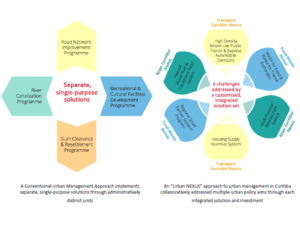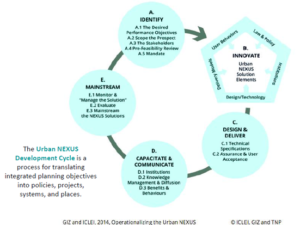18 July 2016
Re-thinking urban upgrading: The Urban NEXUS approach



Hosted by eThekwini’s Municipal Institute of Learning (MILE) and Connective Cities, the peer-learning workshop welcomed participants from South Africa, Zimbabwe, Kenya, Ethiopia, and Germany. ICLEI Africa was invited to present the Urban NEXUS approach as a framework that can guide practitioners in designing integrated solutions for service delivery. The Urban NEXUS approach refers to an approach to the design of sustainable urban development solutions.
The three-day workshop opened with keynote presentations from the hosts, followed by Mr Luyanda Mpahlwa (Design Space Africa) and Mr Christian Schilling (City of Bremen). Providing an overview of key thematic discussions, these highlighted the urgency of tasks in addressing competing sustainable urban development needs, necessitating a paradigm shift. Thereafter, a selection of city case studies was presented for analysis and discussion among the participants, all of which feature good practices on urban upgrading at various stages of implementation set in different local contexts.

These preliminary discussions set the tone for the value that an Urban NEXUS approach can bring to integrated urban planning. Such an approach to the design of sustainable urban development solutions seeks to identify and pursue possible synergies between sectors, jurisdictions, and technical domains, in order to increase institutional performance and optimize resource management and service quality. Its development cycle brings different integrated urban planning methods—some of which have been featured in the case studies—into a coherent framework that would allow for adequate time and capacity to be dedicated towards project planning and implementation. The presentation focused on the development cycle, followed by an example from the 2014 pilot implementation in Kinondoni, Dar es Salaam.

Participants had the opportunity to apply the discourse through real-world examples during the subsequent site visits at housing projects (Conurbia and Lakeheaven) in the host city. Peer-to-peer sessions based on the Urban NEXUS development cycle were also held to foster groupthink in unpacking issues that participants have raised:
1) Isipingo turnaround strategy – Durban
2) Urban renewal – Rusape/ Kadoma, Zimbabwe
3) Reblocking of Havelock informal settlement – Durban
4) Waste minimization in one sub-county – Nairobi
5) Bridge project / township – Durban
Groups are currently busy developing and identifying a way forward to apply the Urban NEXUS approach for these projects, so watch out for updates!
In the meantime please click here to access the Urban NEXUS presentation and refer to this page for more resources on the Urban NEXUS.


